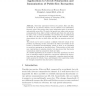33 search results - page 1 / 7 » Public-Key Encryption with Lazy Parties |
101
click to vote
TCC
2005
Springer
15 years 6 months ago
2005
Springer
Adaptively-secure encryption schemes ensure secrecy even in the presence of an adversary who can corrupt parties in an adaptive manner based on public keys, ciphertexts, and secret...
114
Voted
CTRSA
2010
Springer
15 years 7 months ago
2010
Springer
Typical security models used for proving security of deployed cryptographic primitives do not allow adversaries to rewind or reset honest parties to an earlier state. Thus, it is c...
136
Voted
CRYPTO
2011
Springer
14 years 13 days ago
2011
Springer
In CRYPTO 1997, Canetti et al.put forward the intruiging notion of deniable encryption, which (informally) allows a sender and/or receiver, having already performed some encrypted...
112
click to vote
INFORMATICALT
2006
15 years 18 days ago
2006
A convertible authenticated encryption scheme allows a specified recipient to recover and verify a message simultaneously. Moreover the recipient can prove the dishonesty of the se...
95
Voted
CRYPTO
2005
Springer
15 years 6 months ago
2005
Springer
Secret-key agreement between two parties Alice and Bob, connected by an insecure channel, can be realized in an informationtheoretic sense if the parties share many independent pai...

